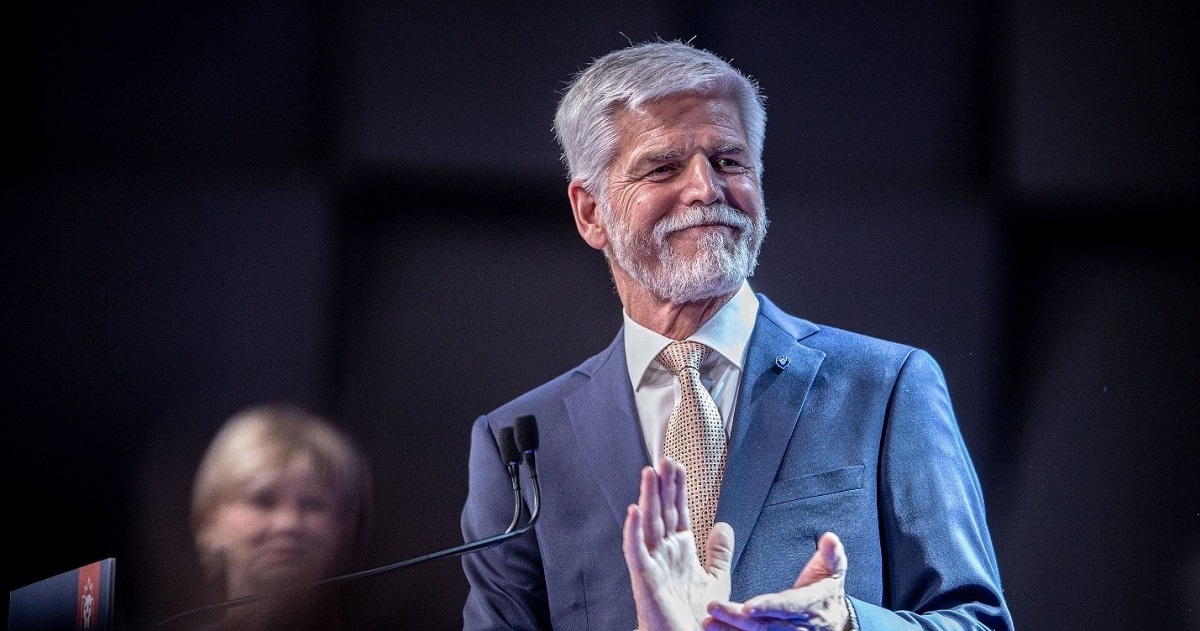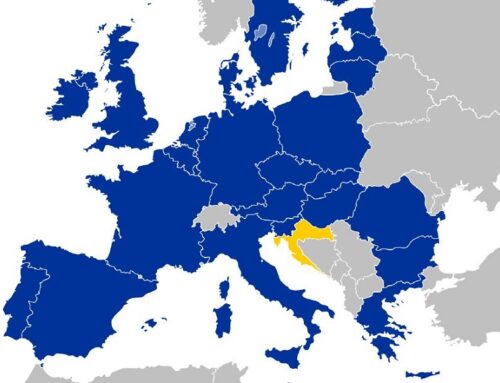In January 2023 presidential elections were held in the Czech Republic. From the very beginning they had been expected to be a significant political milestone for the country. Currently Czech political arena sees an intense competition between two major clusters of political forces- pro-European parties (coalitions SPOLU and Pirates and Mayors) and eurosceptic ANO. During the last decade, attitude to Brussels has become the main division line at Czech political arena, therefore once could easily predict that 2023 presidential elections would become an arena for the next battle of these two major political forces. Indeed, in the second round Andřej Babiš, Czech businessman and leader of ANO, fought for presidency with Petr Pavel, former NATO general, who was backed by pro-European forces. On 27-28 January Petr Pavel won the second round with a convincing support of 58,33% of voters. In this article I examine what were the two major ways of Czech Republic future development that the two candidates presented, why Petr Pavel won the elections and what his victory means for the country.
Three candidates – two alternatives
In the first round of presidential elections Czech voters mainly supported 3 candidates for the presidency, leader of ANO Andřej Babiš and two candidates supported by SPOLU- Petr Pavel and Danuše Nerudová. While there were not that many differences in political programs of Pavel and Berudová, Babiš’s program differed substantially on a number of key issues.
As for common positions, all candidates agree that while tackling energy crisis the state must focus on citizens with low income, further fight inflation and develop nuclear energy. All of them see the need for a pension reform, since its current financing system is not sustainable. Finally, all of them condemn the attempt made by current president Milos Zeman to appoint in advance the Chairman of the Constitutional Court[1]. The presidential term of Zeman ends in March, while the term of the current Chairman of the Constitutional Court – only in August. The Constitution does not mention this possibility; however, it does not exclude it directly either, which creates space for debate. The decision of Babiš not to support Zeman symbolizes the end of the alliance of the two leaders, which lasted a decade, and the desire of Babiš to avoid potential reputational damage that could be made by Zeman’s radical steps. However, the differences in the positions of the candidates were much wider, especially pronounced in foreign policy strategy:
- War in Ukraine has become a key issue for Czech foreign policy. By actively and consistently supporting Ukraine the Czech Republic has managed to enhance its international role. Czech strong support for Ukraine can be explained by the fact that currently the Czech government is formed by pro-European parties (coalitions SPOLU and Pirates and Mayors). The country actively used its presidency in the Council of the European Union to promote pro-Ukrainian agenda in the second half of 2022. Petr Pavel, as a representative of pro-European forces, has been calling for the support of Ukraine since the outbreak of the conflict. Initially he adopted a very radical position and even saw the possibility of sending NATO troops to Ukraine[2]. With the elections approaching, his stance in this regard became more restrained[3], however he still sees support for Ukraine as a crucial task and securitizes its meaning- according to him, the West must push back Russia in Ukraine in order to avoid further military conflicts with it. Nerudová also believes that the Czech Republic should continue its support for Ukraine, even though she seems to be more moderate in this regard. At the same time, Babiš criticized current Czech government for its pro-Ukrainian position and tried to play on voters’ fear of engaging in war with Russia[4]. He opted for a peace talks scenario and referred to Macron’s attempts to establish a dialogue with Russia as the right path[5].
- The different stance of the candidates on Ukrainian war has even broader consequences for their agenda, specifically for their stance on NATO. While Pavel and Nerudová were expectedly consistent in their support for NATO as a key security-insuring instrument, Babiš was made controversial statements in this regard. While he formally supported Czech membership in this organization, he mentioned that he would not send Czech troops to Baltic states or Poland in case of Russian aggression, which would be de-facto violation of Article 5 of the North Atlantic Treaty. Even though later he tried to tone down his own position[6], this fact is symptomatic and is further evidence of the fact that right populists tend to minimize their foreign commitments, including military commitments, even if this may undermine national security in the long term- in this regard we can remind ourselves Trump’s stance, which also potentially questioned Article 5 of the Treaty[7].
- The three candidates also have different positions on adopting euro. While legally Czech Republic has the duty to adopt euro instead of Czech koruna’s, the process lacked dynamics since 2008 crisis. Before the 2008 crisis the majority of Czech population supported adopting euro, however opinion polls after 2008 clearly indicate a substantial shift toward a negative public opinion, even though public attitude has started to improve once again since 2014. This was caused by eurozone crisis as well as understanding of the fact that retaining national currency provides an opportunity to pursue a more flexible monetary policy during crises. At the same time, adopting euro is generally supposed to be beneficial for Czech business and economy. While Petr Pavel and Danuše Nerudová supported the adoption of the common currency under the right conditions, Babiš rejected this idea, emphasizing that national currency is also an important tool of influencing export and import.
Public support of adopting euro by each Eurobarometer survey

- Green Deal is another point of debate between the candidates. While Pavel and Nerudová are Green Deal supporters, Babiš criticizes it, paying special attention to the ban on selling cars with internal combustion engine after year 2035. Babiš’s rhetoric focuses on potential damage of Green Deal for Czech economy.
- Petr Pavel actively supports LGBT rights, he advocates for legalization of same-sex marriages and providing same-sex couples with the right to adopt children- even though in a more moderate manner. Legalization of same-sex marriages is also supported by Nerudová. Babiš has also expressed his support for same-sex marriages, however he was more restrained in his expressions. On top of that, in 2021 he refused to sign a joint letter by 18 EU states in support for sexual minorities in response to a new Hungarian law banning LGBT promotion among children saying that he would not like to interfere in Hungarian domestic affairs[8].
Why Pavel won the elections
Opinion polls for the first round of presidential elections

During the first round of elections both Pavel and Babiš received approximately equal support of voters (35,4% and 35% respectively), while Nerudová finished third with only 13,93% of votes. Nerudová’s campaign was very successful in the period of April-December with her support growing with the highest speed among all the candidates. This allowed her to reach by late November the same level of support as Pavel and Babiš. However, since she has become another major candidate, a more thorough attention of press started to be paid to her and she made a number of mistakes that undermined the whole successful campaign. In spring 2022, a scandal broke out around Mendel University, where Nerudová served as Rector until the beginning of the year. Evidence of translated plagiarism in doctoral papers as well as illegal opportunity for foreign doctoral students to get a degree in 2 years (while 3 is a standard in the Czech Republic) was found. In December 2022 a leak of further evidence of violations at the university happened from National accreditation Office, which proved the existence of double standards for Czech and foreign doctoral students, with latter having an opportunity to get a degree earlier[9]. Nerudová claimed that Dean of the Economic faculty was responsible for these violations, however the scandal heavily damaged her reputation and led to a sharp decrease in the level of her support among voters. Nerudová did not manage to find a solution to the issue and tried to avoid responsibility, which led to a prolonged discussion of the level of her responsibility for the violations in media. Therefore, bad timing of the scandal and bad crisis management strategy of avoiding responsibility disabled Nerudová from potentially getting to the second round of elections.
Opinion polls for the second round of presidential elections

In the second round of elections, one could expect higher support for Pavel, since most of Nerudová’s voters would logically prefer him to Babiš. Indeed, he won it with a persuasive support of 58,32% of voters. Opinion polls indicate that Pavel was a potential favorite of the elections far ahead of the elections date. On the one hand, by the end of 2022 Pavel, even though his support had rising since spring, while Babiš’s stagnated, did not have advantage over Babis in general polls, both candidates enjoyed approximately equal support since August 2022 (since initially Babiš had bigger electoral base). On the other hand, Pavel led in most of Pavel vs Babis polls since summer 2022, consistently receiving 55-60% of votes. However, more important is the fact that in Babiš vs Nerudová polls Nerudová also led consistently with the same support of 55-60%. Even minor candidates for presidency, such as Pavel Fischer and Mark Hilšer, beated Babiš in almost all one-to-one polls with the support of approximately 52-54% of votes. This brings us to the conclusion that Pavel and Nerudová (as well as other minor candidates mentioned) shared common electoral base, which is logical since all of these candidates have pro-European views. One-to-one polls dynamics indicate that the share of this electoral base amounts to approximately 55-60% and did not change sufficiently during at least last half of the year of the presidential campaign.
Given that the main point of debate between Babiš and other major candidates were foreign politics orientation and Czech aid to Ukraine in particular, one could logically assume that eurosceptic/pro-European views shaped electoral bases of the two candidates and predetermined Pavel’s victory (as it was too difficult for Babiš to win elections, since 55-60% of voters wanted a pro-European candidate). However, the reality seems to be more complex. Party polls conducted in 2022 demonstrate that public support for eurosceptic parties (ANO, SPD, KSČM, Promise, Tricolour & Svobodní electoral alliance) and for pro-European parties and alliances (SPOLU, Pirates and Mayors, ČSSD, The Green Party) is equal. This means that approximately 8% of voters would vote for a eurosceptic party, but still in presidential elections either preferred not to vote at all or opted for pro-European Pavel, which is a sign of a high personal anti-rating of Babiš.
Opinion polls on parliamentary voting intention in 2022-2023[10]

A factor that could cause such anti-rating was reopening of the legal case against Babiš in 2022. The politician was accused of using EU subsidies aimed at supporting small- and medium-sized business for his own Čapí Hnízdo (Stork Nest) enterprise. Even though initially Babiš was not found guilty, in 2019 Czech Supreme State Attorney Pavel Zeman ruled that the Stork’s Nest case will be reopened again due to the insufficient quality of evidence[11]. The case was reopened in 2022 with a very bad timing for Babiš- Prague’s Municipal Court began hearing the case on 12th September, which made Babiš appear in negative context in media especially often in the second half of 2022, at the final stage of presidential campaign, which is obviously the most crucial electoral period. Despite of that, Babiš was acquitted in January 2023, a few days before the first round of presidential elections, which was a good timing for the politician[12]. The real amount of reputational damage caused by the case is difficult to estimate, however it can by at least said for sure that since summer 2022 (time when polls about presidential elections started to be conducted regularly) the level of Babiš’s anti-rating was stable, as well as the level of his support, so it seems like the process of hearings at court itself did not damage Babis’s performance that much. This can be explained by that by 2022 voters have already formed their opinion about the case and Babis personally and new the case is going to be reopened since 2019 so their perception of the politician was already well-rooted. As the second round of elections showed, even the fact that the court found Babis innocent did not change his anti-rating in the short term. It is also interesting to compare how little the case damaged Babiš’s rating in comparison to Nerudova’s case. From this we can conclude that, being in politics for many years, Babiš has successfully formed a strong electoral core, which helps him to survive scandal that are deadly for candidates without such political experience.
Therefore, it can be generally assumed that Petr Pavel managed to win elections due to a very high and stable anti-rating of his opponent, based not on his stance on key point on the agenda, but on personal perception of the politician.
What Pavel’s victory means for the Czech Republic
Even though the Czech Republic is a parliamentary republic, Czech president still has a substantial political role. Outgoing president Milos Zeman was famous for his eurosceptic approach, cordial relations with Russia and support for ANO-ČSSD alliance. The new president is certain to bring more stability to Czech government system, since now both legislative and executive branches of power will be under control of pro-European political forces. Even though Pavel sometimes criticizes the government coalition (for example, for being late with the solution to energy crisis last autumn), generally they agree on most point of Czech political agenda, especially in question of supporting Ukraine, for which Pavel’s victory is a very important and positive event. On top of that, Pavel is expected to appoint Josef Baxa to a position of the Chairman of the Constitutional Court[13], which will mean that even in judiciary branch of power pro-European forces will have dominant positions.
At the same time, a total victory of pro-European forces in 2021-2023 does not mean that ANO will disappear from Czech political arena. Instead, support for the party is high and stable, even though same is its anti-rating. Babiš has already called his supporters to vote for ANO in 2025 legislative elections[14]. The future development of Czech political field will mainly depend on a number of key factors:
- whether the governing coalition will be able to retain its unity until next legislative elections
- how successful will the government be in addressing economic crisis (currently it seems to be relatively successful, especially in comparison to Hungary)
- will ČSSD and KSČM be able to cross 5% border in the next presidential elections (currently both of them are somewhere near the border) and will they be eager to cooperate with ANO again (since during last legislative elections both Babis and ČSSD leader Jan Hamáček ruled out such plans[15])
- the overall state of the European Union and international environment, which definitely influences electorate preferences, especially in eurosceptic/pro-European coordinate system
Even though the future of Czech political arena remains unclear, there is still something left that needs to be emphasized. Petr Pavel has made it clear that he is going to make Pražský hrad, the residency of the Czech president, more transparent. He is going to organize symposiums, seminars, debates and other cultural and public activities there. And this is the point that we all – regardless of our political views – should welcome: whatever political changes are going on in a country, with each elections the government should become increasingly opened to society – and in this regard the Czech Republic inspires a sense of optimism!
References:
[1] Zeman chce jmenovat nového předsedu ÚS, čeká na analýzu. Rychetského zkritizoval za aktivismus. – Česká justice. URL: https://www.ceska-justice.cz/2022/12/zeman-chce-jmenovat-noveho-predsedu-us-ceka-na-analyzu-rychetskeho-zkritizoval-za-aktivismus/
[2] Výroky o vyslání mírových jednotek na Ukrajinu pronesl Petr Pavel téměř rok před volbami. – Central European Digital Media Observatory. URL: https://cedmohub.eu/cs/vroky-o-vysln-mrovch-jednotek-na-ukrajinu-pronesl-petr-pavel-tm-rok-ped-volbami/?utm_source=rss&utm_medium=rss&utm_campaign=vroky-o-vysln-mrovch-jednotek-na-ukrajinu-pronesl-petr-pavel-tm-rok-ped-volbami
[3] Ondřej Koutník, Václav Dolejší. Oceláři se Pavla ve fabrice ptali na válku, vojnu i přijetí eura. – Seznam Zprávy. URL: https://www.seznamzpravy.cz/clanek/volby-prezidentske-ocelari-se-pavla-ve-fabrice-ptali-na-valku-vojnu-i-prijeti-eura-223954
[4] Babiš sází na strach z války. Nesmysl, prezident o ničem nerozhoduje, říkají experti. – Aktuálně.cz URL: https://zpravy.aktualne.cz/domaci/billboardy-babis-valka/r~e2b7196295bf11ed9ae20cc47ab5f122/
[5] Proti zvyšování daní bych se tvrdě postavil, říká Babiš. – iDNES.cz URL: https://www.idnes.cz/volby/andrej-babis-rozhovor-prezident.A230111_163841_volby_ijan
[6] Babiš uvedl, že by neposlal vojáky na pomoc v případě napadení Polska. Po debatě výrok na sítích korigoval. – iROZHLAS. URL: https://www.irozhlas.cz/volby/andrej-babis-prezident-nato-debata-ct-petr-pavel-zavazky-vojaci_2301222245_vtk
[7] Rosie Gray. Trump Declines to Affirm NATO’s Article 5. – The Atlantic. URL: https://www.theatlantic.com/international/archive/2017/05/trump-declines-to-affirm-natos-article-5/528129/
[8] Babiš se nepřipojí k výzvě lídrů EU na podporu sexuálních menšin. Dopis označil za „canc“, Piráty obvinil z rozvracení Česka. – Hospodářské Noviny. URL: https://domaci.hn.cz/c1-66949310-babis-se-nepripoji-k-vyzve-lidru-eu-na-podporu-sexualnich-mensin-dopis-oznacil-za-bdquo-canc-ldquo-piraty-obvinil-z-rozvraceni-ceska
[9] Nerudová trvá na tom, že za nespravnosti na univerzitě nese odpovědnost děkam. – Respect. URL: https://www.respekt.cz/kontext/problemy-nerudove-kvuli-univerzite-sili-kontrolor-plaga-je-oznacuje-za-systemove
[10] Politico. URL: https://www.politico.eu/europe-poll-of-polls/czech-republic/
[11] Former Czech premier Andrej Babis finally charged with fraud in Stork’s Nest case. – IntelliNews. URL: https://www.intellinews.com/former-czech-premier-andrej-babis-finally-charged-with-fraud-in-stork-s-nest-case-238721/
[12] Czech presidential candidate Andrej Babiš acquitted of fraud. – The Guardian. URL: https://www.theguardian.com/world/2023/jan/09/czech-presidential-candidate-andrej-babis-acquitted
[13] Pavel nejspíše jmenuje soudce, které Zeman odmítl. Pochybuje, že Hrad objevil nedostatky, které všichni přehlédli. – Česká televize. URL: https://ct24.ceskatelevize.cz/domaci/3561224-pavel-nejspise-jmenuje-soudce-ktere-zeman-odmitl-pochybuje-ze-hrad-objevil-nedostatky
[14] Babiš chystá odvetu. Po porážce ale nejspíš nezmizí jako Zeman. – Seznam Zprávy. URL: https://www.seznamzpravy.cz/clanek/volby-prezidentske-babis-chysta-odvetu-tvari-ano-mezitim-muze-byt-jeho-zena-monika-224703
[15] Předvolební koalice hnutí ANO s ČSSD se nerýsuje. Babiš i Hamáček spojení odmítají. – iROZHLAS. URL: https://www.irozhlas.cz/zpravy-domov/ano-cssd-koalice-volby-milos-zeman-andrej-babis-jan-hamacek_2101211159_tzr





